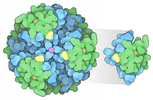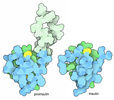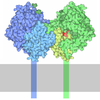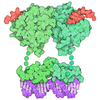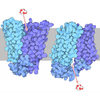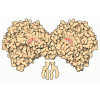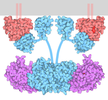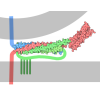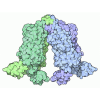[English] 日本語
 Yorodumi
Yorodumi- PDB-1fub: FIRST PROTEIN STRUCTURE DETERMINED FROM X-RAY POWDER DIFFRACTION DATA -
+ Open data
Open data
- Basic information
Basic information
| Entry | Database: PDB / ID: 1fub | |||||||||
|---|---|---|---|---|---|---|---|---|---|---|
| Title | FIRST PROTEIN STRUCTURE DETERMINED FROM X-RAY POWDER DIFFRACTION DATA | |||||||||
 Components Components |
| |||||||||
 Keywords Keywords | HORMONE/GROWTH FACTOR / POWDER DIFFRACTION / RIETVELD REFINEMENT / INSULIN / HORMONE-GROWTH FACTOR COMPLEX | |||||||||
| Function / homology |  Function and homology information Function and homology informationnegative regulation of glycogen catabolic process / positive regulation of nitric oxide mediated signal transduction / negative regulation of fatty acid metabolic process / negative regulation of feeding behavior / Signaling by Insulin receptor / IRS activation / Insulin processing / regulation of protein secretion / positive regulation of peptide hormone secretion / positive regulation of respiratory burst ...negative regulation of glycogen catabolic process / positive regulation of nitric oxide mediated signal transduction / negative regulation of fatty acid metabolic process / negative regulation of feeding behavior / Signaling by Insulin receptor / IRS activation / Insulin processing / regulation of protein secretion / positive regulation of peptide hormone secretion / positive regulation of respiratory burst / Regulation of gene expression in beta cells / negative regulation of acute inflammatory response / alpha-beta T cell activation / Synthesis, secretion, and deacylation of Ghrelin / positive regulation of dendritic spine maintenance / negative regulation of protein secretion / negative regulation of gluconeogenesis / positive regulation of glycogen biosynthetic process / fatty acid homeostasis / Signal attenuation / positive regulation of insulin receptor signaling pathway / negative regulation of respiratory burst involved in inflammatory response / FOXO-mediated transcription of oxidative stress, metabolic and neuronal genes / negative regulation of lipid catabolic process / positive regulation of lipid biosynthetic process / negative regulation of oxidative stress-induced intrinsic apoptotic signaling pathway / regulation of protein localization to plasma membrane / transport vesicle / nitric oxide-cGMP-mediated signaling / COPI-mediated anterograde transport / positive regulation of nitric-oxide synthase activity / Insulin receptor recycling / negative regulation of reactive oxygen species biosynthetic process / positive regulation of brown fat cell differentiation / insulin-like growth factor receptor binding / NPAS4 regulates expression of target genes / neuron projection maintenance / endoplasmic reticulum-Golgi intermediate compartment membrane / positive regulation of mitotic nuclear division / Insulin receptor signalling cascade / positive regulation of glycolytic process / positive regulation of cytokine production / endosome lumen / acute-phase response / positive regulation of long-term synaptic potentiation / positive regulation of D-glucose import across plasma membrane / positive regulation of protein secretion / insulin receptor binding / positive regulation of cell differentiation / Regulation of insulin secretion / wound healing / positive regulation of neuron projection development / hormone activity / negative regulation of protein catabolic process / regulation of synaptic plasticity / positive regulation of protein localization to nucleus / Golgi lumen / vasodilation / cognition / glucose metabolic process / insulin receptor signaling pathway / cell-cell signaling / glucose homeostasis / regulation of protein localization / PI5P, PP2A and IER3 Regulate PI3K/AKT Signaling / positive regulation of cell growth / protease binding / secretory granule lumen / positive regulation of canonical NF-kappaB signal transduction / positive regulation of phosphatidylinositol 3-kinase/protein kinase B signal transduction / positive regulation of MAPK cascade / positive regulation of cell migration / G protein-coupled receptor signaling pathway / endoplasmic reticulum lumen / Amyloid fiber formation / receptor ligand activity / Golgi membrane / negative regulation of gene expression / positive regulation of cell population proliferation / positive regulation of gene expression / regulation of DNA-templated transcription / extracellular space / extracellular region / identical protein binding Similarity search - Function | |||||||||
| Method | POWDER DIFFRACTION /  SYNCHROTRON SYNCHROTRON | |||||||||
 Authors Authors | Von Dreele, R.B. / Stephens, P.W. / Blessing, R.H. / Smith, G.D. | |||||||||
 Citation Citation |  Journal: Acta Crystallogr.,Sect.D / Year: 2000 Journal: Acta Crystallogr.,Sect.D / Year: 2000Title: The first protein crystal structure determined from high-resolution X-ray powder diffraction data: a variant of T3R3 human insulin-zinc complex produced by grinding. Authors: Von Dreele, R.B. / Stephens, P.W. / Smith, G.D. / Blessing, R.H. #1:  Journal: J.Appl.Crystallogr. / Year: 1999 Journal: J.Appl.Crystallogr. / Year: 1999Title: Combined Rietveld and Stereochemical Restraint Refinement of a Protein Crystal Structure Authors: Von Dreele, R.B. #2:  Journal: Biochemistry / Year: 1994 Journal: Biochemistry / Year: 1994Title: Crystallographic Evidence for Dual Coordinate Aroun in the T3R3 Human Insulin Hexamer Authors: Smith, G.D. / Ciszak, E. | |||||||||
| History |
|
- Structure visualization
Structure visualization
| Structure viewer | Molecule:  Molmil Molmil Jmol/JSmol Jmol/JSmol |
|---|
- Downloads & links
Downloads & links
- Download
Download
| PDBx/mmCIF format |  1fub.cif.gz 1fub.cif.gz | 28.6 KB | Display |  PDBx/mmCIF format PDBx/mmCIF format |
|---|---|---|---|---|
| PDB format |  pdb1fub.ent.gz pdb1fub.ent.gz | 17.4 KB | Display |  PDB format PDB format |
| PDBx/mmJSON format |  1fub.json.gz 1fub.json.gz | Tree view |  PDBx/mmJSON format PDBx/mmJSON format | |
| Others |  Other downloads Other downloads |
-Validation report
| Arichive directory |  https://data.pdbj.org/pub/pdb/validation_reports/fu/1fub https://data.pdbj.org/pub/pdb/validation_reports/fu/1fub ftp://data.pdbj.org/pub/pdb/validation_reports/fu/1fub ftp://data.pdbj.org/pub/pdb/validation_reports/fu/1fub | HTTPS FTP |
|---|
-Related structure data
- Links
Links
- Assembly
Assembly
| Deposited unit | 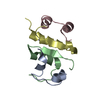
| ||||||||||||||||||
|---|---|---|---|---|---|---|---|---|---|---|---|---|---|---|---|---|---|---|---|
| 1 |
| ||||||||||||||||||
| 2 | 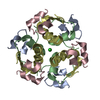
| ||||||||||||||||||
| Components on special symmetry positions |
|
- Components
Components
| #1: Protein/peptide | Mass: 2383.698 Da / Num. of mol.: 2 / Fragment: A CHAIN OF T3R3 VARIANT / Source method: obtained synthetically / Details: This sequence occurs naturally in humans / References: UniProt: P01308 #2: Protein/peptide | Mass: 3433.953 Da / Num. of mol.: 2 / Fragment: B CHAIN OF T3R3 VARIANT / Source method: obtained synthetically / Details: This sequence occurs naturally in humans / References: UniProt: P01308 #3: Chemical | #4: Chemical | #5: Chemical | ChemComp-NA / | Has protein modification | Y | |
|---|
-Experimental details
-Experiment
| Experiment | Method: POWDER DIFFRACTION |
|---|
- Sample preparation
Sample preparation
| Crystal | Density Matthews: 2.04 Å3/Da / Density % sol: 39.64 % |
|---|---|
| Crystal grow | Temperature: 300 K / Method: grinding / Details: grinding, temperature 300K |
| Crystal grow | *PLUS Method: unknown / Details: ground into powder |
| Components of the solutions | *PLUS Conc.: 1.0 M / Chemical formula: NaCl |
-Data collection
| Diffraction | Mean temperature: 300 K |
|---|---|
| Diffraction source | Source:  SYNCHROTRON / Site: SYNCHROTRON / Site:  NSLS NSLS  / Beamline: X3B1 / Wavelength: 0.700233 / Beamline: X3B1 / Wavelength: 0.700233 |
| Detector | Type: OTHER / Detector: DIFFRACTOMETER / Date: Oct 21, 1999 |
| Radiation | Protocol: SINGLE WAVELENGTH / Monochromatic (M) / Laue (L): M / Scattering type: x-ray |
| Radiation wavelength | Wavelength: 0.700233 Å / Relative weight: 1 |
 Movie
Movie Controller
Controller


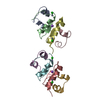
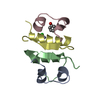
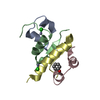
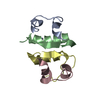
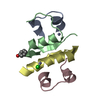
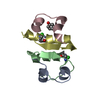
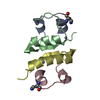

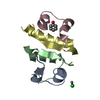
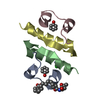
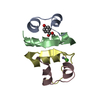
 PDBj
PDBj